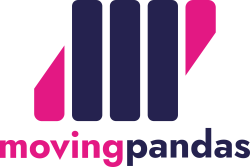2023-08-31, 13:30–15:00 (Europe/Warsaw), Room 18 (Sala 18)
This session introduces MovingPandas and DVC for Mobility Data Science.
MovingPandas is a Python library for the analysis and visualization of movement data. It is built on top of GeoPandas and provides functions to analyze, manipulate and plot trajectories. To get a better idea of the type of analytics that MovingPandas supports, visit: https://movingpandas.org/examples
DVC is a data version control (and machine learning experiment tracking) library. It follows a similar logic to source code version control systems (such as Git) and is typically used together with Git to keep track of data and experiments while Git keeps track of the source code.
In this session, we will use DVC to keep track of our movement data analytics workflow. Participants are expected to come prepared with a working MovingPandas & DVC Python environment. Basic previous experience with (Geo)Pandas and version control systems (i.e. how pull, commit, push works in Git) is expected.
Other
Please provide URL that you plan to use to distribute your materials (if available). –https://github.com/movingpandas/movingpandas-examples/tree/opengeohub2023
Anita Graser in an expert in spatial data science for mobility and transport applications. She graduated with an MSc in Information Technology specializing in Geomatics in 2010 and received her PhD in Applied Geoinformatics from the University of Salzburg in 2021. Since 2007, she works in applied research at the AIT, focusing on spatial analysis of transport and movement data. Furthermore, Anita currently teaches at UNIGIS Salzburg, serves on the project steering committees of the open-source projects QGIS and MobilityDB, and is the lead developer of the open-source software library MovingPandas. She is an internationally sought-after speaker, has published more than 40 scientific articles, and several books. In 2020, she has been awarded the international OSGeo Sol Katz award for her contributions to open-source geographic information systems as well as the national Futurezone Women in Tech Award.

